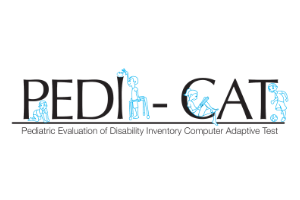Description
The PEDI-CAT is a computer adaptive caregiver report which measures Daily Activities, Mobility, Social/Cognitive, and Responsibility. It’s designed for use with children and youth with a variety of physical and/or behavioral conditions.

The PEDI-CAT is a computer adaptive caregiver report which measures Daily Activities, Mobility, Social/Cognitive, and Responsibility. It’s designed for use with children and youth with a variety of physical and/or behavioral conditions.
The PEDI-CAT is a computer adaptive caregiver report which measures Daily Activities, Mobility, Social/Cognitive, and Responsibility. It’s designed for use with children and youth with a variety of physical and/or behavioral conditions.
Birth to 20 years
Administration:Q-global
Scoring Option:Normative standard scores (provided as age percentiles and T scores) and Scaled Scores.
Scores:Normative standard scores (provided as age percentiles and T scores) and Scaled Scores.
Norms:US Nationally representative sample of 2,205. Additional clinical validation sample of 703 children with disabilities.
The PEDI-CAT measures abilities in four domains: